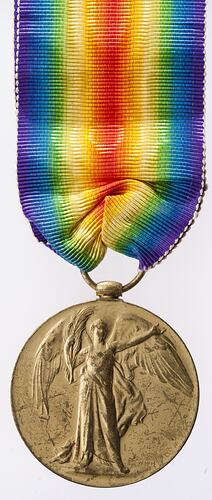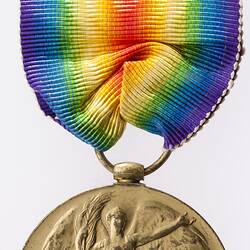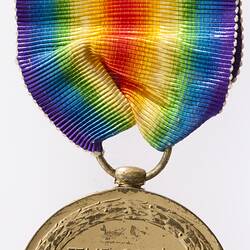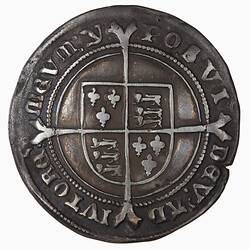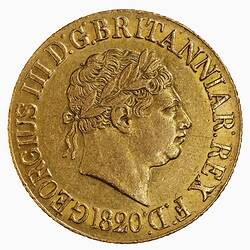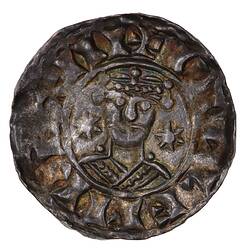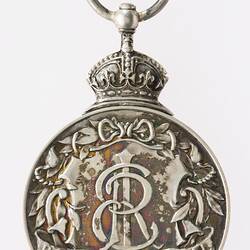Summary
Victory Medal 1914-1919 with ring mount and ribbon awarded to Pte. Frederick James Payne Davies, service number 636, 31st Battalion, A.I.F.
The Victory Medal was authorised in 1919 and was awarded to army, navy and air force personnel who served in a theatre of war between midnight 4th-5th August 1914 and midnight 11th-12th November 1918. The Allies resolved that, if they wished to issue a Victory Medal, it would share a common feature of a depiction of Victory on the obverse and a ribbon of red, yellow, green, blue and violet merged into a rainbow pattern. This medal, that of Great Britain, was awarded to personnel from countries in the British Empire (some 5,725,000 were issued). The other Allied countries that issued Victory medals were: Belgium, Brazil, Cuba, Czechoslovakia, France, Greece, Italy, Japan, Portugal, Romania, Thailand, Union of South Africa and the United States of America.
Obverse Description
Figure of Victory facing three-quarters right with wings spread; in her right hand she holds a palm branch, her left hand is extended and open. The artist's initials, W.McM. (W. McMillan) are above the ground line on the right.
Reverse Description
The words, 'THE GREAT . WAR FOR . CIVILISATION 1914-1919' within a circular wreath of laurel.
Edge Description
Text; '636 PTE. F.J.P. DAVIES. 31 BN. A.I.F.'.
Significance
Awarded to: 636 PTE. F.J.P. DAVIES. 31 BN. A.I.F.
From National Archives of Australia; B2455 World War One service records: 636 Private Frederick James Payne Davies, 31 Battalion, born Yarraville, Joined 12 July 1915 aged 18 years 4 months, Joiner, Father: William Davies, 46 Bayview Rd, Yarraville, Embarked from Melbourne 9 November 1915 on HMAT Wandilla. Egypt 1916, Nov 1917: gunner: gassed; sent to hospital England; Oct 1918, gassed again in France, Returns to Australia Jan. 1919.
References:
http://www.naa.gov.au/The_Collection/Defence/Conflicts/ww1/ww1.html
http://www.awm.gov.au/research/people/nominal_rolls/first_world_war_embarkation/person.asp?p=121588
More Information
-
Collection Names
-
Collecting Areas
-
Acquisition Information
Donation & Subsequent Transfer from Victorian Branch, Returned & Services League of Australia Limited (RSL), Mrs J. C. Trimble, 24 Feb 1986
-
Date Issued
1919 AD
-
Issued By
-
Mint
-
Artist
-
Awarded To
Private Frederick J. Davies, Australia, 1919
636 Pte F.J.P. Davies, 31st Battalion, A.I.F. -
Inscriptions
Obverse; 'W.McM.' (W. McMillan- artist). Reverse; 'THE GREAT . WAR FOR . CIVILISATION 1914 - 1919'. Edge; '636 PTE. F.J.P. DAVIES. 31 BN. A.I.F.'.
-
Material
Bronze
-
Axis
12
-
Classification
-
Category
-
Discipline
-
Type of item
-
Overall Dimensions
50 mm (Height), 36 mm (Outside Diameter)
Height to top of ring.
-
Shape
Round with loop and ribbon
-
References
[Book] Joslin, E C., et al. 1988. British Battles and Medals., 230 - 1 Pages
-
Keywords
